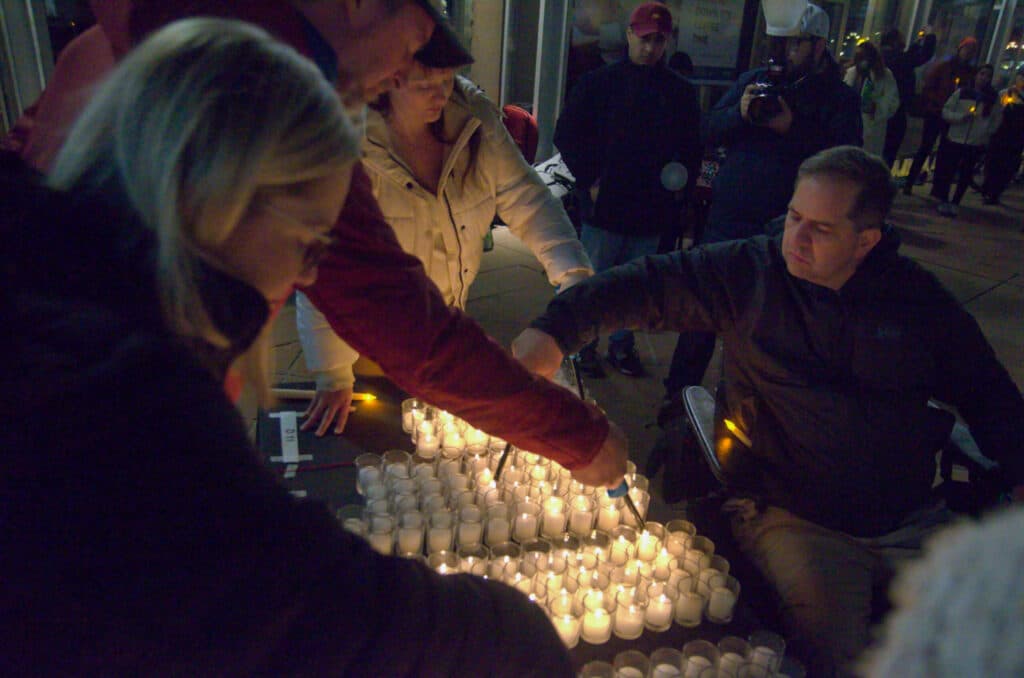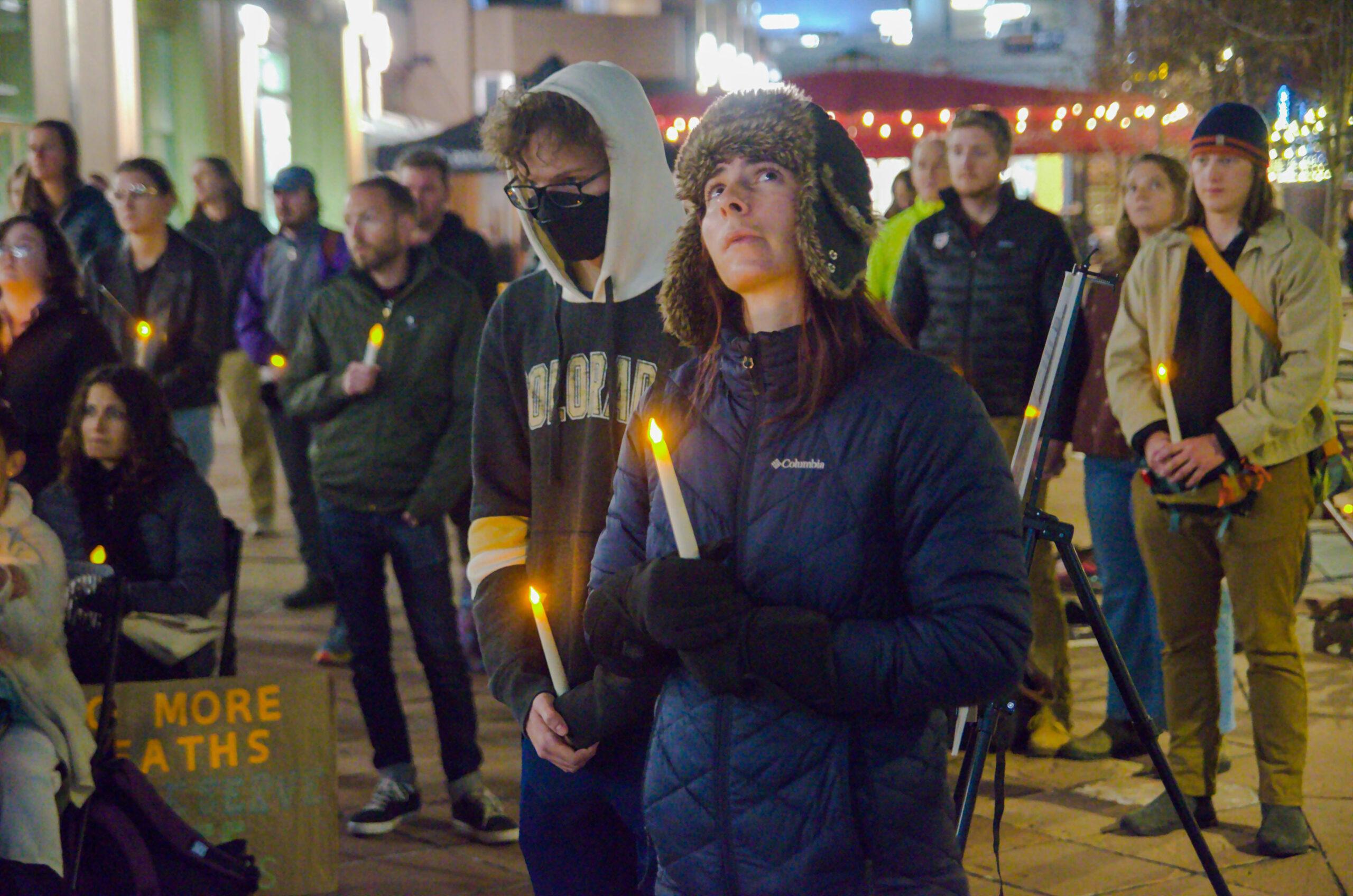As she's done many times before, Denver's leading traffic safety advocate Jill Locantore stood in front of a crowd Sunday evening, passionately talking about the city's dangerous streets and the many people who've died on them.
And per usual, Locantore, the executive director of the Denver Streets Partnership, kept her comments focused on what she sees as the root cause behind the hundreds of deaths and thousands of serious injuries that have happened since Denver's 2016 pledge to eliminate them both by 2030.
"Simply admonishing each other to be safer is not how we're actually going to get to zero traffic deaths," she told a crowd of more than 50 public servants, policymakers, advocates, and passersby on downtown's 16th Street Mall. "What we need is a fundamental transformation of our transportation system, a system that is dangerous by design."
Locantore and Vision Zero advocates across the world say that to actually eliminate traffic deaths and serious injuries, cities and other governments must take responsibility for the safety of their streets. Mistakes are inevitable, the Vision Zero theory states, so governments should redesign streets to force vehicles to drive slower so that the human errors that result in crashes aren't fatal.
A recent city update to its Vision Zero plan embraces those themes and calls for changes staffers say will make streets less deadly, including things like adding more bicycle lanes, better pedestrian crossings, and lower speed limits citywide -- even on busy and dangerous arterial streets that often double as state highways.
The next scheduled speaker was Mayor Mike Johnston, whom advocates like Locantore hope will elevate the Vision Zero work that started -- and stalled -- under previous Mayor Michael Hancock.
Johnston, however, was out of town and did not attend the event. Rather, he sent a 45-second recorded video message that focused not on his administration's work or the transportation system writ large but merely on the individuals who use it.
"Let today remind us to drive safely and think of our loved ones as soon as we step into that car," Johnston said in the recording.
The mayor "is committed to working within the city and with outside partners to prevent traffic deaths in Denver," a spokesperson wrote in an email Monday morning.
A deputy from the Department of Transportation and Infrastructure added at the Sunday event that the city has made "significant investments" since 2016, including 125 miles of bicycle lanes, a rapid response team that assesses and fixes crash-prone spots, and lowering speed limits on side streets.
But deaths and serious injuries have still risen nearly every year since then, said Nicholas Williams, DOTI's deputy manager and chief of staff.
"We know the goal of achieving zero deaths on our streets is ambitious," Williams said. "It requires a fundamental and widespread commitment to a system of safety, a bold commitment to innovation, investment and engagement, a commitment to true equity and a rejection of the idea that some areas of the cities are less deserving of safe transportation infrastructure than others. The city and county of Denver and the Department of Transportation and Infrastructure are committed to that vision."

Protests over traffic deaths are far less common than they used to be. So street safety advocates worldwide try to keep the flame alive with the annual World Day of Remembrance.
In Denver, advocates and others held candles as they walked from the City and County Building to the Daniels & Fisher Tower in Lower Downtown. There, hundreds of names of victims were projected onto the 330-foot tower.
Shoes representing each person killed in 2023 lined the mall. A handful of City Council members and other dignitaries lit hundreds of candles for victims as well.
City Council earlier this month restored some $1 million in transportation safety to the city's 2024 budget, including $550,000 for Vision Zero that Johnston had cut.
"It suggests that perhaps it is even less a priority for the new administration, but we figured that out. We corrected that," said Councilman Chris Hinds, who represents downtown Denver and uses a wheelchair after a car crash in 2008.
A spokesperson for Johnston said Monday the city's Vision Zero program is funded from multiple sources and sees fluctuations every year based on its needs.
"... there was not a specific or intentional reduction for 2024," the spokesperson wrote in an email, adding that total Vision Zero funding will be $2.2 million in 2024.
DOTI's Nicholas Williams said at the Sunday event that the budget also includes $17 million for street safety projects.
Advocates say they understand Johnston has his hands full with his promise to house 1,000 homeless people by year's end. But Hinds and Locantore both said they are looking to Johnston to complete one specific task quickly: Appointing his new executive director of DOTI, the agency that controls the city's streets and oversees a big chunk of Vision Zero work.
That person needs to move "beyond tinkering at the edges," Locantore said.
"We really need to scale up our response to Vision Zero to start bending the curve in the right direction," she said.
One place the city appears to be looking at closely is automated speed cameras, which are newly legal in more places across the state. The restored Vision Zero funding will go toward studies that could result in speed cameras on deadly roads like Federal Boulevard, said Council President Jamie Torres.
"We have to make this better," Torres said.
Editor's note: This story has been updated to include comments on Vision Zero funding from the mayor's office.













